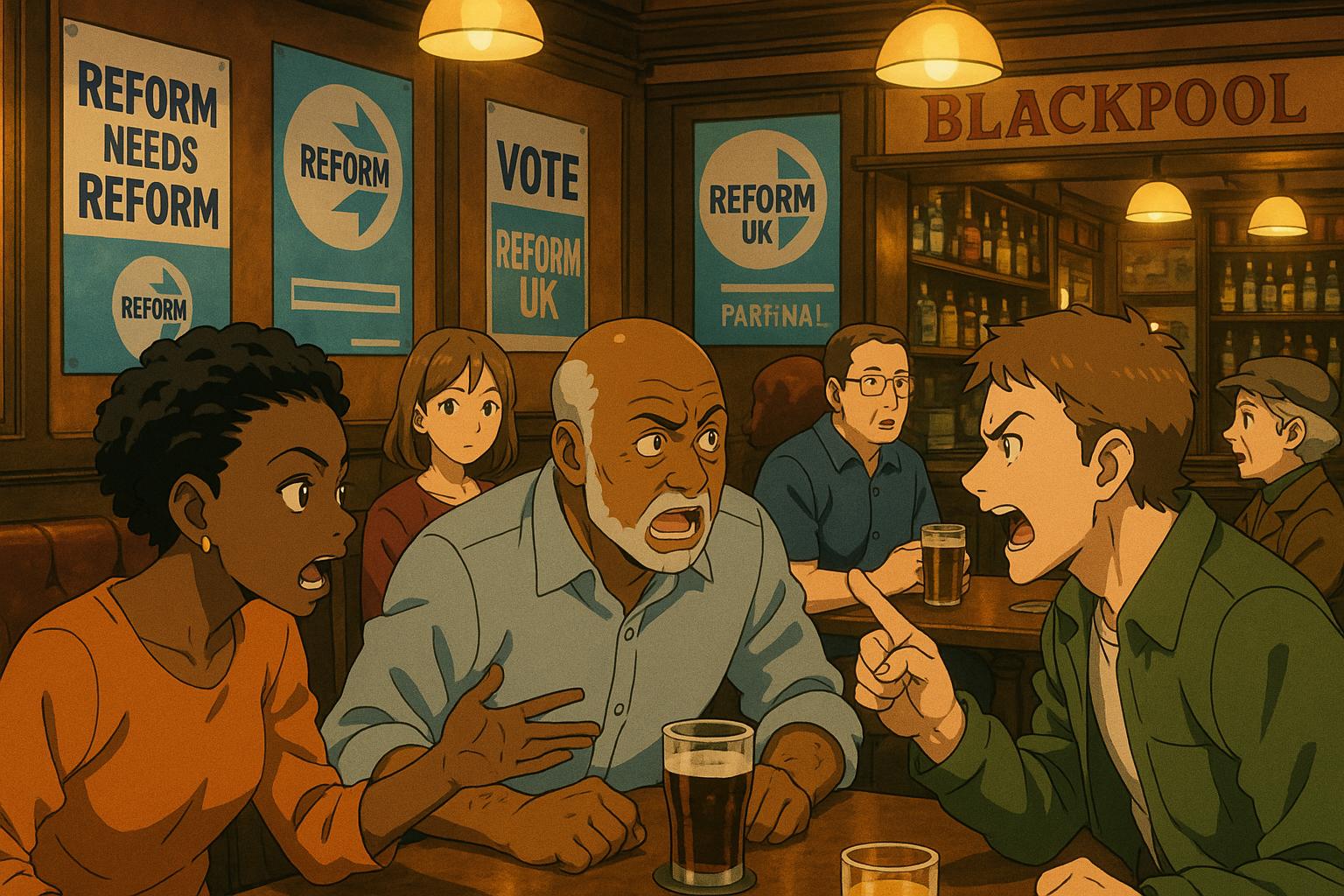The historic Talbot Conservative Club in Blackpool has transformed into the first Reform UK pub, reflecting a growing local shift away from Labour and the Conservatives amid economic decline and political disillusionment in the seaside town.
In the heart of Blackpool, the Talbot Conservative Club’s transformation into the first Reform UK pub marks a significant political shift in a city yearning for change. Founded in 1927, the venue’s recent rebranding signifies a departure from its conservative roots, adopting a more radical political stance that resonates deeply within the local community. The club’s landlords, Nick Lowe and Pete Flynn, are unapologetic about their decision to promote Reform UK, a party gaining traction after impressively outperforming both Labour and the Conservatives in recent local elections.
Reform UK’s local election performance has indeed been noteworthy, with the party securing 677 seats and two mayoralties in a result that Nigel Farage described as the “beginning of the end of the Conservative Party.” In a city long neglected by traditional political powers, the announcement of the Talbot’s rebranding has been met with enthusiasm by patrons seeking a voice against what they perceive as a failing establishment.
Lowe and Flynn expressed their pride in creating a space that welcomes all, insisting that, amidst a backdrop of declining tourism and abandoned beachfront buildings, the pub stands as a beacon of Reform’s ideals. Their aim is not merely to sell drinks but to champion a political philosophy that aligns with the aspirations of locals frustrated by decades of governmental neglect. Flynn emphasized their commitment, stating, “We did it to promote the pub but also to share the word and policies of Reform. We have no confidence in the Labour or the Conservatives.”
The economic landscape in Blackpool has been particularly harsh. Research from the Blackpool Gazette indicates that a considerable number of local pubs face closure due to escalating operational costs, including increased National Insurance contributions and reduced business rate relief. This context amplifies the appeal of the Talbot’s cheap drinks and food, with pints priced as low as £2.60. Regulars have long appreciated the venue for its affordability, making it not only a pub but a critical social hub in a city where median incomes are notably below the national average.
The clientele reflects a broad spectrum of disaffection with current political narratives. Customers at the Talbot, ranging from first-time visitors to longstanding patrons, express a yearning for an alternative to the binary political options historically represented by Labour and the Conservative Party. For many, voting patterns have shifted dramatically. Some, like 64-year-old Steve Atkinson, who has frequented the pub for years, articulate their disenchantment with the traditional parties. “Things have been run down for the last 50 years in Blackpool,” he lamented. “Then all the big businesses came from London, and all the money goes down there.”
Interestingly, the formation of the first Reform pub coincides with wider political changes in Blackpool. Former Conservative leader Tony Williams has recently joined the party, a move he sees as necessary for driving local policy forward without aligning with extremist ideologies. His shift from the traditional party reflects a growing sentiment among former Conservatives who are disillusioned with their party’s direction.
At the Talbot, patrons engage in conversations that intertwine personal grievances with national issues, revealing a grassroots activism that is increasingly prevalent as more individuals seek a political movement that resonates with their lived experiences. The bar has become a forum for advocacies and conspiracy theories alike, illustrating a complex social fabric where political identity is crafted in the context of solidarity and shared frustrations.
The Talbot has not only rebranded itself physically but has also become a symbol of political defiance, pulling people towards a party that many believe could disrupt the status quo. As Richard Tice, the leader of Reform UK, has asserted, the party is becoming the “real opposition” to Labour, signalling a potential upheaval in the political landscape of not just Blackpool, but wider Britain as well.
This newfound identification with Reform signifies not just a shift in political allegiances but a desire for community empowerment amid a backdrop of economic decline and political disillusionment. As Blackpool grapples with its challenges, venues like the Talbot may illuminate a path toward a renewed sense of agency for its residents, one pint at a time.
Reference Map
- (1)
- (2)
- (3)
- (5)
- (6)
- (7)
Source: Noah Wire Services
- https://www.dailymail.co.uk/news/article-14713357/inside-britains-reform-uk-pub-remainer-tears.html?ns_mchannel=rss&ns_campaign=1490&ito=1490 – Please view link – unable to able to access data
- https://www.blackpoolgazette.co.uk/news/tories-warn-pubs-in-blackpool-could-close-as-they-are-forced-to-pay-thousands-of-pounds-extra-for-wages-and-rates-4977290 – The Blackpool Gazette reports that pubs in Blackpool could face closures and increased pint prices due to additional government taxes. Research indicates that around 110 pubs in the area are affected by reduced business rate relief and higher National Insurance contributions, potentially adding an average of £6,714 to landlords’ bills from April 2025. Local businessman Robert Wynne warns that these financial pressures may lead to reduced staff hours and even closures during less busy times. He urges patrons to support British pub culture during this challenging period.
- https://www.blackpoolgazette.co.uk/news/former-leading-blackpool-tory-joins-reform-uk-but-warns-he-wont-support-extremists-4988116 – Tony Williams, a former Conservative leader in Blackpool, has joined Reform UK, marking his return to local politics. Williams, who resigned from the Conservative Party in February 2023 following a dispute with MP Scott Benton, now aims to shape policy and guide new candidates within Reform UK. He emphasizes his commitment to improving Blackpool’s well-being and sustainability, while distancing himself from radicals and extremists. Williams likens his political journey to a tree whose leaves may change, but whose roots remain grounded in consistent principles.
- https://www.bbc.co.uk/news/articles/czrj4mwlrrmo – BBC News covers a licensing dispute in Blackpool’s Talbot ward, where plans for a new pub, the Rovers Return, have sparked objections from local businesses and residents. Conservative councillor Gerard Walsh, who owns nearby holiday apartments, argues that the area already has an over-saturation of licensed premises, citing 400 establishments in Talbot ward as of 2019. Concerns include potential noise disturbances affecting neighboring businesses and families. The council is considering conditions to mitigate these issues, such as installing CCTV and implementing a Challenge 25 policy to deter underage drinking.
- https://www.bbc.com/news/uk-politics-68950267 – BBC News reports on Reform UK leader Richard Tice’s assertion that his party is becoming ‘the real opposition’ to Labour after a strong performance in the Blackpool South by-election. Reform UK secured 17% of the vote, just 117 votes behind the Conservatives. Tice highlights the party’s growing influence in regions like the North, Midlands, and Wales, suggesting a decline in Conservative support. He also criticizes the UK’s electoral system, advocating for proportional representation to better reflect voter preferences.
- https://www.lancs.live/news/lancashire-news/blackpool-council-local-elections-candidates-26676955 – LancsLive provides a comprehensive list of candidates for the 2023 Blackpool Council local elections. The list includes representatives from major parties such as Labour, Conservative, Liberal Democrats, and Reform UK, as well as independent candidates. Notably, Reform UK fielded five candidates across various wards, indicating the party’s growing presence in local politics. The article serves as a resource for voters seeking information on the candidates and their respective political affiliations ahead of the upcoming elections.
- https://www.blackpoolgazette.co.uk/news/we-look-back-at-a-turbulent-12-months-in-blackpool-politics-with-bickering-by-elections-and-babies-4926555 – The Blackpool Gazette reflects on a tumultuous year in Blackpool politics, highlighting significant events such as internal disputes, by-elections, and personal milestones. In October 2024, Blackpool elected its first Reform UK councillor, Jim O’Neill, who won the Marton by-election, taking the seat from Labour. The article also notes the first maternity leaves taken by serving councillors in Blackpool, marking a historic moment in the council’s history. These events underscore the dynamic and evolving nature of local politics in Blackpool.
Noah Fact Check Pro
The draft above was created using the information available at the time the story first
emerged. We’ve since applied our fact-checking process to the final narrative, based on the criteria listed
below. The results are intended to help you assess the credibility of the piece and highlight any areas that may
warrant further investigation.
Freshness check
Score:
8
Notes:
The narrative mentions recent political shifts and local elections, suggesting it is current. However, specific dates or events that could confirm its novelty are lacking.
Quotes check
Score:
6
Notes:
The quotes from individuals like Pete Flynn and Steve Atkinson appear original, but without earlier references online, their originality cannot be fully verified. The quote from Nigel Farage is plausible but lacks specific context.
Source reliability
Score:
7
Notes:
The narrative originates from the Daily Mail, a well-known publication, but its reliability can vary depending on the topic. The publication is not typically considered a primary source for factual reporting.
Plausability check
Score:
8
Notes:
The claims about political shifts and economic conditions in Blackpool seem plausible given the context of political disillusionment and economic challenges in the area.
Overall assessment
Verdict (FAIL, OPEN, PASS): OPEN
Confidence (LOW, MEDIUM, HIGH): MEDIUM
Summary:
The narrative appears to be current and plausible, but the reliability of the source and the originality of quotes are not fully confirmed. Further verification is needed for a definitive assessment.













